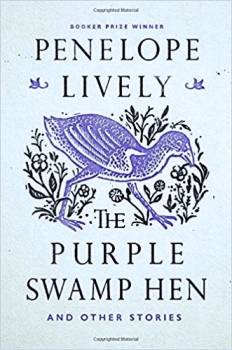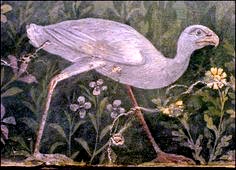Note: Dame Penelope Lively, Order of the British Empire (OBE), and Dame Commander of the Order of the British Empire (DBE) for her services to literature, was WINNER of the Booker Prize in 1987 for Moon Tiger, set in Egypt during the British Occupation.
“You know me. You know me on the famous garden fresco from Pompeii…[but] you don’t cry – oh! a Purple Swamp Hen, because the vast majority of you can’t recognize one. You eye me with vague interest, and pass on. It’s just like a garden today! you cry. No, it isn’t…I am – was – in this garden because it was a Roman garden and the Romans kept us there for ornamental purposes….The garden of Quintus Pompeius, where I passed my time, was nothing like any garden you’ve ever known.” –Porphyrio porphyrio, the Purple Swamp Hen.
 This swamp hen goes on to describe the Roman garden, which “hosted fornication, incest, rape, child abuse, grievous bodily harm – and that’s just Quintus Pompeius, his household, and his associates.” And, the hen states, the humans were far more imaginative than the fauna, which “simply got on with the business of copulation and reproduction.” Clearly establishing the satiric tone of this and many other stories in her new story collection, her first in almost two decades, author Penelope Lively continues to prove that great writing – elegant, precise, completely attuned to nuance, and committed to using exactly the right word and not one word more – still exists for lovers of fine prose. She further shows that fine writing need not be stuffy or effete, that humor is an integral part of life, and that satire may be more effective in conveying ideas than polemics and criticism. Best of all, she shows that stories, though short, may convey big ideas and that collections of stories may represent different times and different forms and still develop a broad thematic unity within the collection.
This swamp hen goes on to describe the Roman garden, which “hosted fornication, incest, rape, child abuse, grievous bodily harm – and that’s just Quintus Pompeius, his household, and his associates.” And, the hen states, the humans were far more imaginative than the fauna, which “simply got on with the business of copulation and reproduction.” Clearly establishing the satiric tone of this and many other stories in her new story collection, her first in almost two decades, author Penelope Lively continues to prove that great writing – elegant, precise, completely attuned to nuance, and committed to using exactly the right word and not one word more – still exists for lovers of fine prose. She further shows that fine writing need not be stuffy or effete, that humor is an integral part of life, and that satire may be more effective in conveying ideas than polemics and criticism. Best of all, she shows that stories, though short, may convey big ideas and that collections of stories may represent different times and different forms and still develop a broad thematic unity within the collection.
Author Lively, concerned during her whole career with relationships, especially family relationships and the forces which create havoc within them, starts this collection of fifteen stories with “The Purple Swamp Hen,” the quotations above establishing the tone and the perceived moral superiority of swamp hens to the Romans who treat them as decorations – and sometimes eat them. The hen notes the “curious” behavior of homo sapiens in owning other members of homo sapiens as slaves, of eating for entertainment, and, even worse, drinking to excess which they “find enjoyable rather than humiliating.” The cruelty and the difficulties of the elite in leading ethical lives are quite different from the lives of the “fauna” and the human slaves which surround them, and Porphyrio is eternally grateful to a young, abused slave girl who saves him from being tormented by children in the household. When the second earthquake in two days strikes Pompeii, just before the eruption of Mt. Vesuvius, the hen warns the slave girl to run, and, sensitive to nature and volcanoes, “knows that this [life] would end, but was also a beginning.” Swamp hens would forevermore lead completely different lives, though “it is not for me to proclaim progress, or otherwise.”
The last story in the collection, “The Third Wife,” recreates a modern version of the society of the Romans which the swamp hen had earlier found wanting. In this clever story, Molly, the wealthy third wife of Stan, has been looking for real estate and has found an Edwardian house which perfectly suits her – large, no near neighbors, with its own drive, lovely gardens, a great kitchen, and another feature which she thinks will appeal to Stan. Here, too, the promise of a better life and the cleverness of a main character shine through the tumult and offer delights to the reader. In between these two stories are thirteen more dealing with relationships, many of which become unhappy and later become reconciled, one way or the other. In “Abroad,” two young artists in their early twenties go to Europe after university, considering themselves on a par with peasants as they drive around and lead simple lives (always knowing that they can get whatever funds they really need from home). A car breakdown changes their lives, forcing them to reevaluate their lives.
“Who Do You Think You Were” deals with family lines and histories and may remind readers, once again, of some aspects of “The Purple Swamp Hen,” especially when a young woman in 1787, who knows how to skin a rabbit but does not know how to read or write, gets a rooster, destined for the pot, for her aunt. When she hands it over, she feels “a goose walking over my grave.” In a parallel thread from 2015, another woman, Caroline Gladwell, is doing research in graduate school. She, however, cannot pluck a fowl or skin a rabbit. She is working in the British Library on her family history. Duplicate names and similar accidents show her the connections with the past. “A Biography” is a story of relationships as Julia Pemberton investigates the story of Lavinia Talbot, a seventy-year-old woman who died suddenly in 2012. Lavinia, her sister Alice, Alice’s husband, Lavinia’s husband, her cousin, her former roommate, and her two lovers all tell their recollections of Lavinia. Gradually, the reader considers all of these different and sometimes conflicting depictions of Lavinia and comes to a conclusion about who Lavinia really was and why she behaved as she did.
 Sly literary references add to the enjoyment of several stories. “License to Kill” about a woman in her mid-eighties and her working relationship with an 18-year-old maid, contains a reference to “The Love Song of J. Alfred Prufrock,” (“Shall I eat a peach?”), and “Mrs. Bennet” gives a modern twist to the Mrs. Bennet of Pride and Prejudice, as Frances Landon, with limited funds, tries to marry off her three daughters by having them schooled in riding so that they can associate with the gentry during hunting season. The fates of the three daughters are different, with the youngest managing to escape the destiny into which the other two fall willingly. “The Bridge” features Alison, a sixty-year-old woman who has lost a child, and as the points of view shift between her, her husband, and her surviving daughter over twenty years later, the ironies of memory and the passage time affect the reader.
Sly literary references add to the enjoyment of several stories. “License to Kill” about a woman in her mid-eighties and her working relationship with an 18-year-old maid, contains a reference to “The Love Song of J. Alfred Prufrock,” (“Shall I eat a peach?”), and “Mrs. Bennet” gives a modern twist to the Mrs. Bennet of Pride and Prejudice, as Frances Landon, with limited funds, tries to marry off her three daughters by having them schooled in riding so that they can associate with the gentry during hunting season. The fates of the three daughters are different, with the youngest managing to escape the destiny into which the other two fall willingly. “The Bridge” features Alison, a sixty-year-old woman who has lost a child, and as the points of view shift between her, her husband, and her surviving daughter over twenty years later, the ironies of memory and the passage time affect the reader.

The Purple Swamp Hen, in a mural in the home of Quintus Pompeius during the Roman Empire, is a continuing motif throughout this collection.
Considering virtually every possible relationship between husband and wife and lovers and friends within this delightful and enjoyable collection, Penelope Lively depicts her society over the ages and draws conclusions about life from the point of view of an author, now in her eighties. Lively has much to say, often ironically or satirically, to a younger generation, which still has much to learn. Clever, often humorous, and filled with insights, this collection, for all its variety, creates a vision of life and love that is broader and more varied than what is usually possible within the specific boundaries of a novel. This collection will be treasured by lovers of fine prose, elegant style, and rich characterization, especially of the elderly.
Also by Penelope Lively: SPIDERWEB, MOON TIGER, HOW IT ALL BEGAN
Photos, in order: The author’s photo by David Levenson appears on http://www.gettyimages.com/
The Edwardian “strong room” is shown on https://au.pinterest.com/
The British Library Reading Room is from http://goodereader.com/
The Beaufort Hunt depicts traditional British country life: http://www.dailymail.co.uk/
The garden mural in the home of Quintus Pompeius depicts the Purple Swamp Hen, whose point of view in opposition to the Romans is represented in the first story in this collection. http://i.telegraph.co.uk



